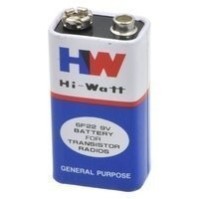





9V HYW BATTERY
Hi-Watt 9V Battery is the most commonly used and portable 9V battery. It is non-rechargeable and is a high capacity and low-cost solution for many electronic devices. It is based on Zinc Carbon Chemistry and can be used easily replaced if discharged just like any standard AA and AAA batteries.
₹ 22 ₹49
49
Add FAQ
A 9V HYW battery is likely referring to a 9V battery produced by HYW or a similar brand. The 9V battery is a standard battery size commonly used in various electronic devices. Here’s a comprehensive guide on its characteristics, usage, and considerations:
Overview
Key Specifications
- Voltage: 9 volts (nominal)
- Capacity: Varies by type; typically around 500 mAh to 600 mAh for alkaline, but can be lower for other chemistries.
- Size: Standard 9V battery dimensions are approximately 48.5 mm x 26.5 mm x 17.5 mm (1.9 in x 1.0 in x 0.69 in).
- Chemistry: Common types include alkaline, lithium, and rechargeable NiMH (Nickel-Metal Hydride).
Types of 9V Batteries
-
Alkaline:
- Advantages: Long shelf life, widely available, inexpensive.
- Disadvantages: Non-rechargeable, limited to primary applications.
-
Lithium:
- Advantages: Longer life, better performance in extreme temperatures.
- Disadvantages: More expensive, non-rechargeable.
-
Rechargeable NiMH:
- Advantages: Rechargeable, can be cost-effective in the long run.
- Disadvantages: Lower capacity compared to alkaline or lithium, requires a specific charger.
Usage
Connecting the Battery
- Devices: Used in various devices such as smoke detectors, remote controls, wireless microphones, and more.
- Voltage Regulation: Ensure that your device is designed to operate at 9V to avoid damage.
Battery Life
- Current Draw: Battery life depends on the current draw of the device. For example, a device drawing 50 mA will run for approximately 10 hours on a 500 mAh battery (neglecting efficiency losses).
- Capacity: Higher capacity batteries will last longer but may be larger and more expensive.
Charging and Maintenance
For Non-Rechargeable Batteries
- Disposal: Dispose of non-rechargeable batteries properly according to local regulations, as they may contain hazardous materials.
- Replacement: Replace with a fresh battery when performance drops.
For Rechargeable NiMH Batteries
- Charging: Use a charger specifically designed for 9V NiMH batteries. Follow the manufacturer's instructions for charging times and procedures.
- Maintenance: Regularly cycle the battery to maintain performance and prevent memory effects.
Practical Applications
- Smoke Detectors: Commonly used to power smoke alarms.
- Remote Controls: Used in some older remote controls.
- Portable Electronics: Powers various small electronic devices.
- Testing Equipment: Often used in electronic testing tools and meters.
Safety Considerations
- Avoid Short Circuits: Ensure the battery terminals do not come into contact with conductive materials to avoid short circuits.
- Prevent Leakage: Store batteries in a cool, dry place. Replace old batteries to prevent leakage, which can damage devices.
- Proper Disposal: Follow local guidelines for the disposal of batteries, especially for non-rechargeable types which may contain hazardous substances.
Troubleshooting
- Device Not Working: Verify battery connections and ensure the battery is installed correctly.
- Battery Leakage: If you find leakage, clean the device contacts and dispose of the battery safely.
- Reduced Performance: Replace the battery with a new one or check if the device has any issues affecting power consumption.
Conclusion
A 9V HYW battery, whether alkaline, lithium, or rechargeable, is a versatile power source for many electronic devices. Understanding its characteristics and proper usage can help ensure reliable performance and extend the life of both the battery and your devices. If you have specific questions or need additional details about using or handling this battery, feel free to ask!
0 Reviews For this Product








2.jpg&width=225&quality=80)

